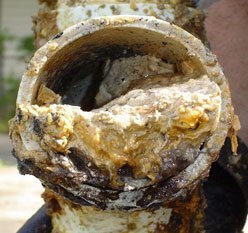Sometimes, as much as we all hate to admit it, business is slow. Whether it’s a seasonal reduction in customers, or a global pandemic wreaking havoc on everyone’s existence, it’s essential to plan slowed service times.
While you’re probably familiar with the basics of your grease trap, it can be easy to ignore your tank’s needs– especially during times of uncertainty. However, whether you realize it or not, your grease trap plays a vital role in your business’ maintenance. Simply put, without it, there would be no business. Although your grease trap is crucial in a restaurant setting, there are several other reasons you should focus on maintaining regular grease trap cleanings even amidst reduced service.
Grease Waste Damage
Restaurant grease is a byproduct of food production – which comes with the all-too-common decomposition process. When grease traps harbor food waste for too long, sulfuric acid will begin building up in the tank. While this process is relatively harmless at first, over time, it could cause chemical damage to the tank itself if not cleaned regularly. This applies to wastes of all sizes – meaning, the longer you wait, the more buildup is created – so, it’s best to stay within the EPA’s recommended three-month cleaning span to avoid any damages to your grease trap over time.
Rotting Smell
If you work in or near a restaurant, this one is all too common. Due to the process mentioned above, your grease trap is bound to start smelling increasingly pungent the longer you wait to have it serviced. This is due to the decomposition process and buildup of sulfuric acid – most commonly known for its “rotten egg” smell. Waiting too long between grease trap servicing will allow this rotting smell to eventually make its way back through your pipes and into the restaurant (yes, even the toilet and bathroom sinks), likely leading to some displeased customers.
Difficulty to Maintain Your Grease Trap Over Time
As if the first two weren’t already enough to have you running to call your grease trap service provider, another huge – and rather expensive – issue to worry about is grease trap damage over time. While it’s normal for your grease trap to experience some general wear-and-tear throughout the years, allowing grease to rest for too long can significantly speed up this process. When a grease trap is left unserviced, the waste can quickly add up – resulting in blocked drains and hardened materials within the grease trap itself. This issue prompts blocked pipes, making your grease trap more difficult to maintain over time. The best way to prevent this is to ensure your facility regularly services their grease trap with a trained provider.
It’s easy to ignore your grease trap – especially during times of uncertainty – but doing so can result in more harm than good for your business. Pick a company you can trust to get the job done right. At Environmental Remedies, we not only provide full grease trap servicing but also treat your waste via our own onsite treatment facility here in Atlanta, Georgia.
In the Atlanta area and looking to schedule your next grease trap service appointment? Get started by requesting a quote. Need a little more information? Feel free to contact us, and we can help get you started!






